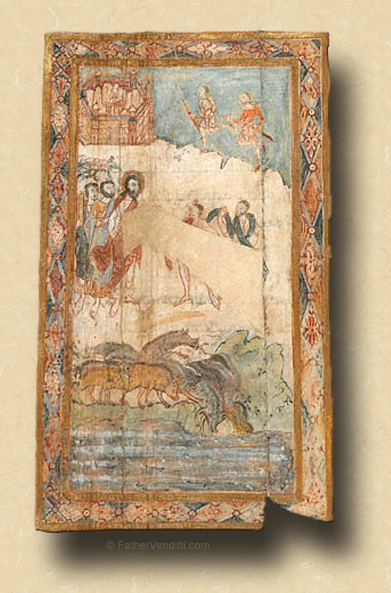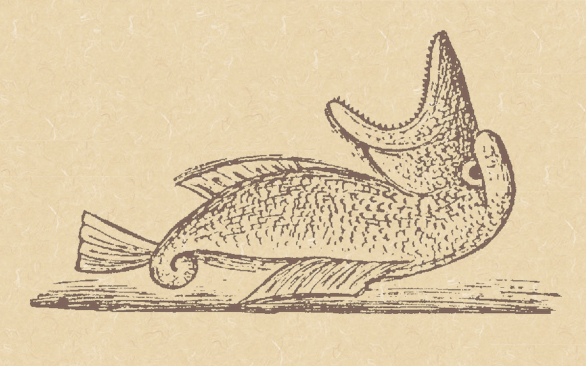For Our Lord, It's All or Nothing.
The Fourth Monday of Ordinary Time.
Lessons from the primary feria, according to the ordinary form of the Roman Rite:
• Hebrews 11: 32-40.
• Psalm 31: 20-24.
• Mark 5: 1-20.
The Third Class Feast of Saint Andrew Corsini, Bishop & Confessor.*
Lessons from the common "Státuit…" of a Confessor Bishop, according to the extraordinary form of the Roman Rite:
• Ecclesiasticus 44: 16-27; 45: 3-20.
• [Gradual] Ecclesiasticus 44: 16, 20.
• Matthew 25: 14-23.
FatherVenditti.com
|
 6:36 AM 2/4/2019 — I like, sometimes, to look at the little minor things that happen in the Gospel that no one else bothers to look at. And I was drawn to one particular sentence in today’s Gospel lesson. Here Jesus exorcises demons from a man, casting the demons into a herd of pigs. This is nothing unusual for our Lord; but, what I find interesting is that, after He does it, they run Him out of town, or, as Saint Mark so politely puts it, “Whereupon they began entreating him to leave their country” (5: 17 Knox). Now, there could be a lot of reasons for that: He is, after all, wandering around the country of the Gerasenes who are Gentiles, which is confirmed by the presence of a herd of pigs, which you would never find in the country of the Jews because they don’t eat pork. So, it’s possible they just didn’t like Him because He was a Jew. It’s also possible they didn’t think much of having a whole herd of swine disposed of in such a casual manner. 6:36 AM 2/4/2019 — I like, sometimes, to look at the little minor things that happen in the Gospel that no one else bothers to look at. And I was drawn to one particular sentence in today’s Gospel lesson. Here Jesus exorcises demons from a man, casting the demons into a herd of pigs. This is nothing unusual for our Lord; but, what I find interesting is that, after He does it, they run Him out of town, or, as Saint Mark so politely puts it, “Whereupon they began entreating him to leave their country” (5: 17 Knox). Now, there could be a lot of reasons for that: He is, after all, wandering around the country of the Gerasenes who are Gentiles, which is confirmed by the presence of a herd of pigs, which you would never find in the country of the Jews because they don’t eat pork. So, it’s possible they just didn’t like Him because He was a Jew. It’s also possible they didn’t think much of having a whole herd of swine disposed of in such a casual manner.
But one commentary I read suggested a more sinister possibility: it suggests that
The attitude of [the] local people towards this miracle reminds us that meeting God and living a Christian life require us to subordinate personal plans to God’s designs. If we have a selfish or materialistic outlook we fail to appreciate the value of divine things and push God out of our lives, begging him to go away, as these people did.**
And I found that to be a very astute observation; because I’ve found—and perhaps you have, too—that even people who pray very much are secretly wishing that God would keep His nose out of it. I think of Saint Augustine who, before his conversion, while in the midst of a life of reckless abandonment, prayed to God saying, “God, give me chastity, but not yet.”
We want things from God. We want relief from our sufferings, we want an end to our troubles, we want to enjoy good health, we want family harmony, we want success in our relationships, and God is not adverse to giving us these things; but, that’s not all you get when you haggle with God. When you accept Christ into your life, your whole life changes, or at least it should. This is what our Lord meant when he said, “If anyone wishes to come after me, he must deny himself and take up his cross daily and follow me” (Luke 9: 23 NABRE). In other words, it’s a package deal: the price is that you give yourself completely to Him.
And there’s a lot of us who don’t want that deal. I remember when I was first ordained chatting with one of the neighbors who lived in the house behind the church, and she was chewing my ear off about all of her problems, and why doesn’t God ever listen to her prayers. And as it turned out she wasn’t practicing any religion at all with any regularity, and had lived with a succession of men, both in and out of marriage. And here’s she’s wondering why God has not come to her rescue. She wants the benefits of a relationship with Christ, but she doesn’t want the relationship itself; because any relationship—particularly one with God—is a two way street. It’s like a man who finds a nice girl who loves him, but he only wants what he can get from her, and he’s not interested in any kind of commitment to her. So he strings her along and takes what he wants without giving her the kind of security and protection that that kind of relationship implies, until he’s used her to the point that she just loses patience.
Well, our Lord Jesus Christ is very patient, but He is not a milquetoast. He certainly is willing to forgive us when we go astray, particularly in the sacrament of confession, but even the forgiveness we receive in confession implies an effort to change. If we’re continually praying to God for this or that, but aren't making any effort to live a life that conforms to his plan as found in the Gospel and the teachings of the Church and of the Fathers, then what’s in it for Him? How long can we reasonably expect God to go on watching over us, protecting us, comforting us, simply because we’ve asked Him to, but continue to reject Him in the way we live our lives? And when our lives are over, and a decision must be made regarding the final disposition of our souls, what will we have to show in return for all we have received from God? Will we not say something like, “Well, I knew what Christ wanted, but it was too much for me to handle; I did the best I could.” Will we really have done our best? Or will we have simply convinced ourselves that what we were willing to do was our best, when, in fact, we never really knew what our best was because we never really tried?
The Gerasenes had to be impressed by our Lord casting out demons and helping this man whom no one else could help. But they understood the implications of His presence among them; and, while they were happy for the man who was now free, they weren’t willing to give anything in return; so they asked Him to leave. Which He did. God forbid that any of us, who have received so much from our Lord, would ask Him to leave.

* Corsini, in his youth, had led a dissolute life, but through the prayers and supplications of his mother, experienced a conversion, becoming a Carmelite Friar. He later became Bishop of Fiesole, near Florence, and died in 1373.
** “St. Matthew,” The Navarre Bible, p. 89.
|

